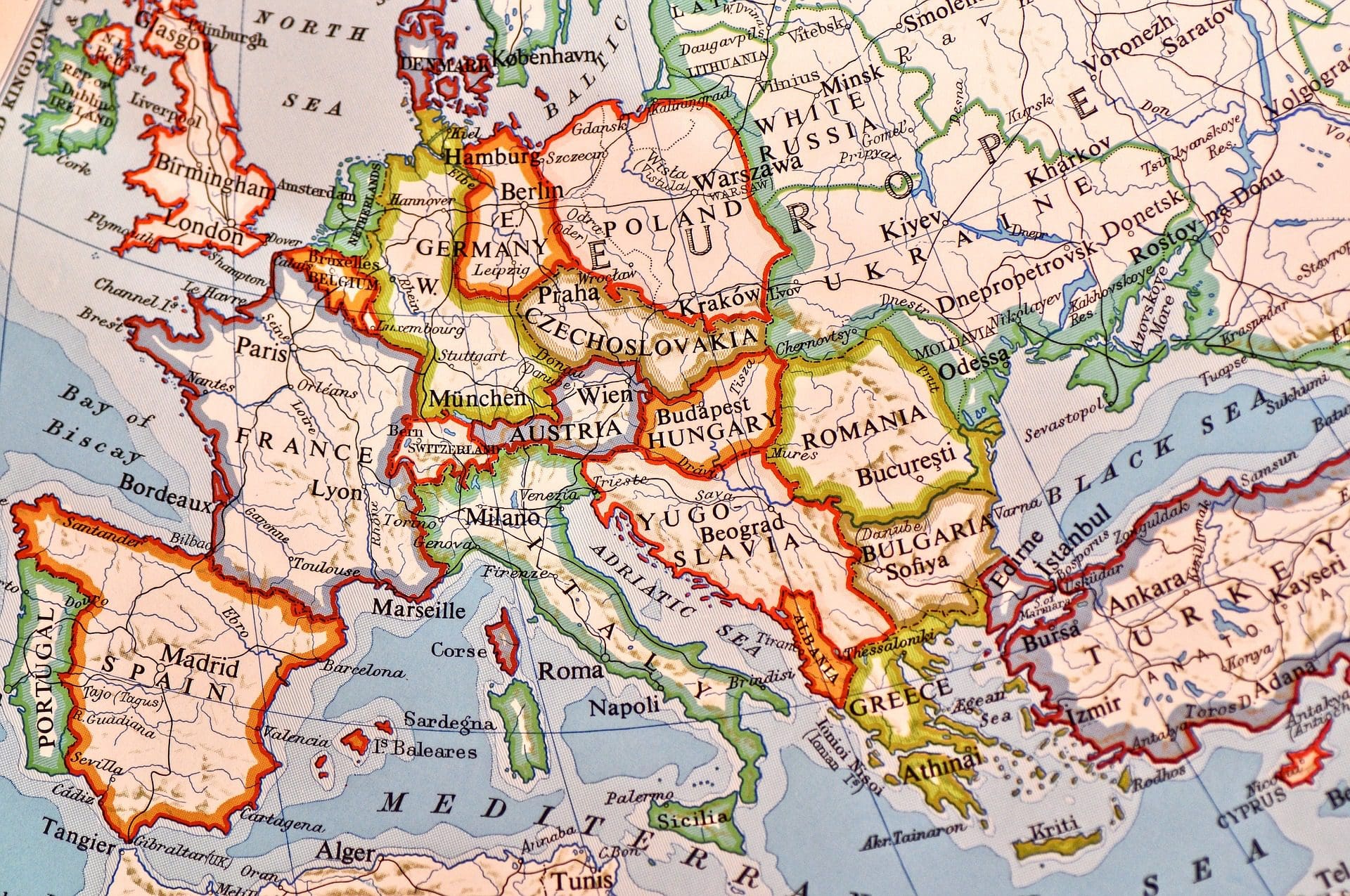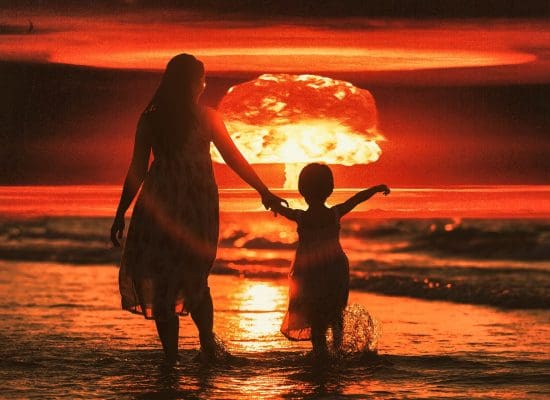Post photo: old map of Europe | © Mabel Amber on Pixabay
Never again war!
It all began when, in 1945, after a good 31 years of murder and manslaughter, the guns finally fell silent in Europe. Almost the entire world lay in ruins and the wars were shifted to regions of the world that were further away from us and less interesting for the western world.
Never again war! was the conclusion that was valid at least in 1945 in Europe for the large majority of the population; the unifying bond of people of all peoples of European nature. Beyond everything else, however, there were still more opinions and beliefs than clear-thinking people.
Luckily for us, the key decision-makers of our peoples agreed at the time that there was only one world and that it had to be rebuilt in a democratically legitimized manner and, in the distant future, also united in a “world union”. But even the first United Nations assembly showed that there was not even agreement on what "democracy" or "one world" actually was.
And in Europe, too, the democrats did not just fall out of the sky in 1945. It was still the same people as before who now had to be persuaded of the advantages of democracy. It quickly became clear to everyone involved that "Never again war!" could neither support a democracy nor prevent a future war.
Europe united in diversity
However, the solution to prevent future wars within Europe was quickly found: European unification with joint European armed forces. Since the nationalists as well as the supporters of a pure "economic community" quickly recognized that the federal state of Europe was the inevitable consequence, this promise was withdrawn as early as 1950. To this day, peace-loving Europeans have to live with the assertion that democracies do not wage wars among themselves. And the demand for a "European army" repeatedly heard from politicians can only be interpreted as an indication of ignorance or an impending election campaign, unless it goes hand in hand with the demand for a federal state of Europe.
Common interests
But how were the European visionaries able to make democracy palatable to us Europeans back then?
It has never been possible to win a majority in Europe with the terms “freedom” and the associated “personal responsibility”. That is why the “promise of prosperity for all” was born. And above all because of us Germans, people also promised “safety” – the German aphrodisiac.
With the promise of prosperity and security, those responsible at the time were able to get us Europeans enthusiastic about democracy and, incidentally, also got us enthusiastic about European unification, especially since it gave us even more security, even more prosperity and other amenities such as freedom to travel and consumer goods from all over the world promised.
In the long term it was believed that through education and culture we Europeans would not only develop into better people, but also into good democrats and, in the long run, into convinced Europeans. That is why education and culture were also of great importance in politics in the early years of Europe.
challenges
However, the manifestation of democracy and the creation of a common Europe had several snags. Because "safety" never existed and will not exist in the future either (George Orwells "1984" once excluded). In addition, this motivates the citizens to adopt a kind of “fully comprehensive mentality” that is not conducive to any democracy or people.
In the long run, and above all in democracies – the “open societies” – this promise will always have to disappoint, and as a result work towards the system models that can better meet the demand for “security” through control, bondage and oppression. and
"Prosperity for all" is a promise that can be fulfilled, especially in democracies, but constantly needs to be adapted to the actual circumstances and therefore a new social consensus will always have to be found. Without this consensus, this promise cannot be fulfilled, even with the best will in the world, and will inevitably cause every democracy to falter.
It is essential to always ensure that no citizen falls into poverty through no fault of their own, even if this repeatedly represents a challenge for society as a whole and, in the worst case, can also lead to major redistribution of wealth in order to save the entire system.
However, the essential catch of democracy is and remains the citizen himself. Participation of as many citizens as possible is imperative; without them, any democracy is meaningless and this ultimately leads to its own dissolution.
Taking this into account, the vast majority of European democracies have opted for the representative model from the start. This relieved the individual citizen, the main responsibility for selecting suitable people's representatives was increasingly delegated to parties and the Sisyphean task of increasingly complex tasks was transferred to the elected representatives.
But it was also and logically clear from the beginning that the citizens were and had to be denied the diverse and sometimes very charming possibilities of direct democracy models.
In view of the sheer size of today's democracies, the extremely complex issues and also in view of recent experiences with referenda and referendums, one simply has to recognize that the increasingly popular mixing of models of democracy is not expedient and, particularly in the most recent case of the United Kingdom, has devastating effects for everyone involved may have.
But even a representative democracy requires a minimum level of commitment and responsibility from each individual citizen. Democracy cannot simply be "outsourced" - every functioning democracy thrives on the participation of its citizens.
It is true that the selection of suitable candidates can be left to the political parties; but then one shouldn't be surprised if one doesn't find a "suitable" people's representative for oneself.
One can also leave it up to the political parties to choose the political issues of the day, the problems to be solved and the goals to be set; but even then one should not be surprised if one does not find oneself in politics.
And above all: politics does not come cheap! If you want good politics, you either have to do it yourself or elect the best possible politicians. And you don't get this for free. As long as a second-rate footballer or bank manager earns more than a minister or head of government, one shouldn't be at all surprised at the way politics works these days and the results they get.
First successes
Peace, freedom and the prospect of prosperity for all were already showing signs of success in the early 1950s. We Europeans agreed; the vision of a common and democratic Europe inspired everyone.
The enlargement of the market, the facilitation of the movement of people and goods, the abolition of customs duties and the standardization of standards were successful in all affected European countries right from the start. The promise of prosperity was increasingly fulfilled and Europe became more and more attractive for other countries.
The economic upswing began and continued, as more and more nations joined the original six and thus further promoted economic development and efficiency. It is undisputed that the Federal Republic of Germany benefited the most and as a result we Germans also became avowed Europeans.
Others, on the other hand, who are benefiting less from this development, are still somewhat more skeptical about Europe as a model of success and are also more inclined to give preference to other political models.
However, it is also undisputed that this economic upturn and the associated promise of prosperity revealed its own limits right from the start and made it clear that the expansion of the economic area is finite, that our own resources are scarce and that the population structure and size are developing negatively. For this reason, efforts to reach free trade agreements can also be viewed as attempts to use the available economic space as optimally as possible.
This is compounded by the fact that the exploitation of other continents and populations by Europe is not only becoming less and less possible, but that high consequential costs are also to be expected in the future - the current refugee movements to Europe can certainly be regarded as such consequential costs.
European birth defect
Therefore, a further deepening of European relations from the outset, as originally envisaged by the European visionaries, would have been necessary in order to secure economic development better and more long-term at an early stage through efficiency gains, coordinated procedures and innovations, and to make Europe a pioneer of sustainable economic activity .
However, as with the attempted communitization of the armed forces, it became apparent here that the interests, legal opinions and political models of the participating states – despite all the successes achieved so far – are still too different today and, moreover, there is still little willingness on the part of most of those involved , to ultimately expand the European Union into a federal state.
And with all the attempts by the European institutions and individual member states to advance the European Union slowly but surely and in small steps, the causal and fundamental differences between all those involved are still neither openly discussed nor attempted to harmonize them - this is Europe's real birth defect !
That is why it is still not possible to make a common foreign and security policy, let alone draft one.
That is why there can be no uniform economic and fiscal policy and certainly no uniform domestic and legal policy. A pan-European awareness seems to have developed in the area of transfer payments and subsidies alone.
Franco-German question
Our European visionaries were probably fully aware of this birth defect from the start. That's how you have to Winston Churchill understood in this way, once he had called for Franco-German cooperation, ignoring the United Kingdom. To this day, France and Germany represent the two antipodes of a common European policy.
On the one hand, despite the EU, we still have an elitist central state to this day, which, in order to manifest its power over the population - probably in view of the French Revolution of 1789 - makes economic and social concessions that cannot be financed in the long term and cannot support the system.
On the other hand, we have a federal democracy that exhibits strong centrifugal forces due to the inherent complexity of the system and the intentional promotion of individual and particular interests.
Right from the start, there are great difficulties in being able to communicate with each other in a goal-oriented and level-appropriate manner. To make matters worse, both systems now use the same terminology, but often do not understand it to mean the same thing and have not been able to formulate and decide on a common interest to this day.
Only when this Franco-German question has been resolved can there be a federal state of Europe. (I am now convinced that this issue can no longer be resolved bilaterally, because there are no suitable and determined politicians on either side.)
European Realpolitik
On the other hand, many politicians, including the British, saw this open Franco-German issue as an opportunity to participate in the economic upturn in Europe and later in the economic power of the EU, without running the risk of being overrun by a possible centralized European state.
The power of the factual and the tendency of institutions not only to expand but also to position themselves have created our European Union in recent years, which now has over 500 million citizens and is one of the largest economic and market powers, but also in unparalleled in the complexity and ambivalence it has achieved.
The European visionaries had already disappeared in the 1970s and the Realpolitiker Helmut Schmidt formulated aptly in 1980 - probably after another attempt to stabilize the EWG: "Anyone who has visions should go to the doctor."
And to this day, the realpolitik dominates in the European Union, dragging itself from one set of rules that has apparently become necessary to the next - the system, which has grown over decades, has politics completely under control!
The European Union has thus mutated into a pure "administrative apparatus" - and who loves administrations?!
And even the members of the European Parliament allow themselves to be forced into this treadmill, instead of – admittedly from a German federal point of view – formulating the major goals and common interests of Europe at the appropriate level, to implement the federal system throughout the EU, entirely in the spirit of the Subsidiarity to transfer tasks to the parliaments responsible for them and to demand the competence for the state monopoly on the use of force.
The European Parliament, which is now the only truly legitimized body, must finally provide the citizens of the Union with the vision they have had to so painfully give up over the last few decades.
Because without the vision of a functioning, democratic, peace-loving and federal Europe, which promises all citizens of the Union both the greatest possible freedom and well-being, our Europe will again disintegrate into national and regional sub-units and thus at best can still promise the older Union citizens a future - and this completely with the meaning of Norbert Blüm: "the pensions are safe" or from Mme de Pompadour: "Après nous le déluge."
It is now the turn of Europe's youth
In the first place, it is up to the youth of Europe to make their own politics and to take care of their own future. It is no longer enough to be calmed by the comforts of a Europe united in diversity and to speculate on a possible legacy.
Now it is finally time to remove the barriers in the minds and hearts of the citizens of the Union before they become reality again at every inner-European border.
And even a federal state of Europe, which is to be created as soon as possible, will in the meantime have fallen short for the European future.
If young people don't take their future into their own hands today, here and now, maybe there won't even be a European Union tomorrow!
"We should all be concerned about the future because we will have to spend the rest of our lives there."
Charles F. Kettering, The New Digital Age: Reshaping the Future of People, Nations and Business (2013)








